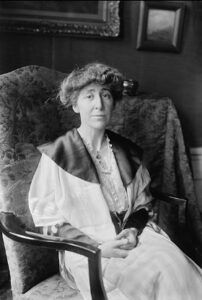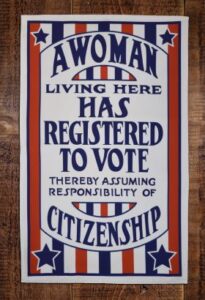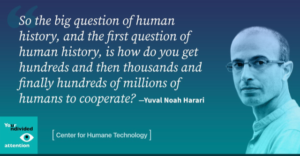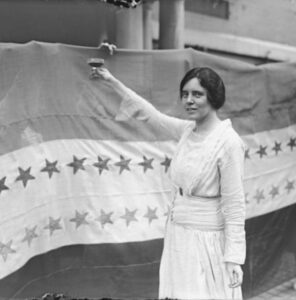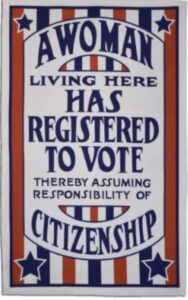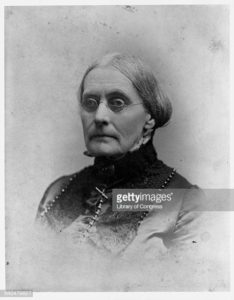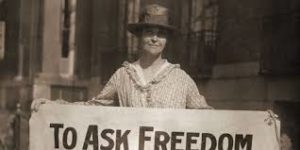19th Amendment
She was first.
June 11, 2021“It’s Jeannette Rankin’s birthday! This exceptional Montanan was the first woman elected to Congress. Jeannette’s proud legacy of standing up for her beliefs has long served to inspire folks across our state, and will for years to come.”
-Montana Senator Jon Tester
“Suffrage activist from Missoula County, Montana, Rankin was elected Congresswoman for her home state in 1916, four years before the 19th Amendment.
Thanks to the struggle of women like Rankin, Montana had abolished the sex-based franchise in 1914, making it the seventh US State to do so.
With the help of the political allies she had made campaigning for suffrage, Rankin was then elected to the House of Representatives on the progressive wing of the Republican Party.
This made Rankin the first woman in the history of the US Congress.
But, while there was now one Congresswoman, there were still millions of American women legally voteless.
It wasn’t until the 19th Amendment was passed in 1920 that women across America were given the right to vote.
So, with work left to be done, Rankin used her new position in Congress to at last drive through a constitutional amendment enfranchising women.
She was the one who first put forward what became the 19th Amendment – the ultimate triumph of her movement.
But suffrage was not the only thing on Rankin’s agenda. The late 1910s were not, after all, a quiet time in US political history…
In April 1917, Woodrow Wilson summoned Congress to an extraordinary session so that he could get the US to declare war on Germany and join the conflict in Europe.
Jeannette Rankin was one of only 50 members of Congress to vote against Wilson. A devout pacifist, she would not support America entering WW1.
Singled out for disproportionate abuse by the pro-war lobby, Rankin got support from the radical movement which was then mobilizing against the war. Figures like Fiorello LaGuardia and fellow suffrage fighter, Alice Paul, (my s-hero) backed Rankin.
On 8 December 1941, to a chorus of heckles, she was the only member of congress to vote against declaring war on Japan, saying, “as a woman I can’t go to war, and I refuse to send anyone else.”
Whilst many credentialed radicals did criticize Rankin’s failure to appreciate the unique nature of WW2 as a war which needed to be fought against fascism and genocide, the subsequent hounding and denunciation of her in the US press was unconscionable.
Her political reputation left in tatters, Rankin declined to run again in 1942.
But she lived a long life after the Second World War – long enough to return to radical fame as an elder in the struggle against the US invasion of Vietnam in the 1960s and ‘70s.
In January 1968, when she was 87 years old, Jeannette Rankin marched through D.C. at the head of 5,000 women protesting against the Vietnam War.” Right on.
-Pete, Radical Tea Towel https://www.radicalteatowel.com
Today at the G7, Boris Johnson:
think that is what the people of our countries now want us to focus on. They want us to be sure that we are beating the pandemic together and discussing how we will never have a repeat of what we have seen but also that we are building back better together,’ he said.
‘Building back greener and building back fairer and building back more equal and, how shall I, in a more gender neutral and, perhaps a more feminine way. (Yep.)
The Eagle and the Condor prophecy of the Amazon speaks of long ago when human societies split into two different paths—that of the Eagle and that of the Condor. The path of the Condor is the path of heart, of intuition, and of the feminine. The path of the Eagle is the path of the mind, of the industrial, and of the masculine. [https://blog.pachamama.org]
Unity?
January 19, 2021Documentary film maker Ken Burns:
“I used to think there were three great crises: the Civil War, the Depression and the Second World War in American life. I would add this. And maybe this is the very, very worst. But at the same time, we just keep going forward. There is no other option but to endure.” [NPR]
‘Well, darkness has a hunger that’s insatiable, and lightness has a call that’s hard to hear.’
-Indigo Girls
American politics has reached a moment of existential uncertainty. Beyond the headlines and news alerts are problems bigger than any one administration—problems that stem from the deep tensions and challenges in America’s political institutions.
It’s time to reevaluate and revisit how we think about American democracy. The Founding Fathers did their best, but the hosts of a new podcast, “Politics in Question,” have some ideas, too. They discuss political reforms in this first-of-its-kind show that asks the very biggest questions.
Join hosts Lee Drutman, Julia Azari, and James Wallner, three lively experts on American political institutions and reform, as they imagine and argue over what American politics could look like if citizens questioned everything.
There are a lot of podcasts about the daily chaos. But “Politics in Question” is the first to step back and think big about the basic structures and processes of democracy — and to take nothing for granted.
This podcast is part of The Democracy Group, a network of podcasts that examines what’s broken in our democracy and how we can work together to fix it.
“From all the thoughts of ‘I’ and ‘man,’ that man finds utter peace.”
Bhagavad Gita
Dear Dayle,
The extremist behavior and violence that took place in Washington, D.C. on January 6 was truly shocking and worthy of condemnation—many have already done so. The whole world is transfixed, bearing witness to the awful and extraordinary unfolding of history.
In my previous letters I wrote about the DISORDER that is already upon us, as well as the consequences that ensue when illusions of power and privilege co-opt and distort Christianity. At the Center for Action and Contemplation, we are free to speak in great part because we are not beholden to the usual constituencies. Using the brilliant metaphor from the Hebrew Scriptures, we are “outside the camp” of either political party, any need to influence an election, and, by the grace of God, any negative or fear-based church pressure from Rome, Santa Fe, or Assisi.
We are also, like few other organizations, free from the coercion of donors and finance, thanks to almost thirty-three years of operating with our priorities clearly in view to all who cared to study or read our publications. Blessedly, our donors have not run for cover over time, but only increased in numbers, continuing to join us—even from outside the usual camps of both religion and politics.
Few people enjoy such freedom of living and teaching from the edge of the inside. This is the unique position that a prophetic charism holds and for which it is responsible; it is structurally quite rare, and therefore we must use it.
“Moses used to take the tent, and pitch it outside the camp, at some distance from the camp. . . . Anyone who wanted to consult Yahweh would go to this tent of meeting outside the camp.” (Exodus 33:7)
The “tent of meeting” is the initial image and metaphor that eventually became our much later notion of “church.” Moses had the prescience and courage to move the place of hearing God outside and at a distance from the court of common religious and civic opinion—this was the original genius that inspired the entire Jewish prophetic tradition. It is quite different than the mere liberal and conservative positions, and often even at odds with them. Most of liberalism is based on a secular foundation of knowledge, and most of conservatism is identified with boundary-keeping, order, and control. By contrast, Prophecy and Gospel are rooted in a contemplative and non-dual way of knowing—a way of being in the world that is utterly free and grounded in the compassion of God.
The early desert fathers and mothers imitated both Moses and Jesus by fleeing to Egypt, Syria, Palestine, and Cappadocia—and some as far as Ireland and Scotland. Beginning in the 4th century, we Christians surrendered our unique and free perspective to the Roman and Byzantine Empires. In the desert and outside the camp, these people discovered what we now call “contemplation”: the alternative mind and the alternative community to the status quo—then and now—of money, power, and war.
The free and graced position found in the tent of meeting is what allowed Jesus and all prophets in his lineage to speak from a minority position. It is always less desirable, compared to the comfortable and enjoyable places at the center and the top; yet it is the Jesus stance, and the place where all Franciscans follow after him.
“Let us go to him, therefore, outside the camp, and be willing to share in his degradation.” (Hebrews 13:13)
For many people, religion as a “cosmic egg” capable of holding universal Truth, collective and personal meaning, is broken. Now, the cracks in this very “uncosmic egg” are rapidly spreading in all directions. Delusions enthrall us and inherent deceit becomes overwhelmingly apparent and manifest in the nihilism of our postmodern age, the denial of science and reasonableness, and the denial of the pandemic that now assaults us all. The very future of the meanings of words and truth are at stake, as specifically exemplified by Trumpism in its many forms.
We must again move with Jesus outside the camp and even be willing to “share in his degradation” if that be God’s will. We must trust that the one who has called us into this present moment will also sustain us and lead us through it.
“Yahweh would speak with Moses face to face [outside the camp] as a young man speaks with his friend. And then Moses would return to the camp.” (Exodus 33:11)
This is the primary vocation of the Center for Action and Contemplation. We invite you to join us—first, in the tent of meeting outside the camp for prayer, dialogue, and deep discernment. Then, like Moses, we must all choose to “return to the camp,” where all of our brothers and sisters live and die.

Maybe unity is not possible, yet, we can remember that we are one, one in humanity as species and co-creators in our reality with ourselves and in each other…especially in context and proximity of losing our democracy, our republic, just three weeks ago. Can we pledge, at least, to cooperation? To listening? To empathy?
We are ‘we the people.’ Let us remember. And may we vow today to divest ourselves from the for-profit platforms and groups that feed disinformation and hate into our collective bloodstream. It must end.
And in less than 24 hours, the first woman vice president in the United States.
-dayle
🤍
And still they persisted…for decades.
August 18, 2020Alice Paul makes a toast to Tennessee’s ratification of the 19th Amendment to the U.S. Constitution giving women the right to vote, August 18th, 1920. The banner beside her was displayed outside the National Women’s Suffrage Party Washington DC, headquarters. [AP]
‘There will never be a new world order until women are a part of it.’ Alice Stokes Paul [1885 – 1977] was an American suffragist, feminist, women’s rights activist, and one of the main leaders/strategists of the campaign for the #19th Amendment to the U.S. Constitution.

Nevertheless, she persisted.
February 15, 2020
|
|
|
|
Happy Birthday Susan B. Anthony!
Today marks what would have been her 200th birthday.
The year 2020 marks the centennial anniversary for women’s suffrage, when the 19th amendment took effect giving some women the right to vote in U.S. elections. And on Saturday, one of the movement’s key figures, Susan B. Anthony, would have turned 200. In honor of the famed activist and the women’s suffrage movement, a unique event is kicking off this weekend in New York. Karla Murthy reports.
https://www.pbs.org/newshour/show/cultural-institutions-celebrate-womens-suffrage-centennial
The Washington Post
For Klobuchar and Warren, the 2020 primary is an endurance race
Now, almost exactly three years later, the phrase seems to be a campaign strategy for Warren and Sen. Amy Klobuchar (Minn.), the two top-tier women in the 2020 Democratic presidential primary.
On Tuesday night, at the first-in-the-nation primary in New Hampshire, Klobuchar surged ahead, finishing third with 19.3 percent of the vote, with more than 91 percent of precincts reporting Wednesday morning.
Bounding onto the stage in Concord, N.H., on Tuesday night, joined by her husband, John, and daughter, Abigail, Klobuchar beamed as she addressed the crowd: “Tonight is about grit. And my story, like so many of yours, is one of resilience.”
Warren, whose mantra is “Outwork, Out-Organize, Outlast,” is taking a similar approach. While she finished third in the Iowa caucuses and fourth in New Hampshire, hours before the polls closed Tuesday, she rolled out her endurance strategy in a memo to supporters.
Klobuchar and Warren have both said they are running campaigns of durability, an approach that may favor female candidates who tend to be judged on performance rather than potential, said Democratic strategist Jen Palmieri.
[full read]
Also, happy birthday today to abolitionist, suffragist and friend to Susan B. Anthony, Frederick Douglas, marking what would have been his 202nd birthday.
“I would unite with anybody to do right and with nobody to do wrong.”
In 1848, Douglass was the only African American to attend the Seneca Falls Convention, the first women’s rights convention, in upstate New York. Elizabeth Cady Stanton asked the assembly to pass a resolution asking for women’s suffrage. Many of those present opposed the idea, including influential Quakers James and Lucretia Mott. Douglass stood and spoke eloquently in favor; he said that he could not accept the right to vote as a black man if women could not also claim that right. He suggested that the world would be a better place if women were involved in the political sphere. [theodysseyonline.com]
E qual R ights A mendment
February 13, 2020NPR
2.13.2020
‘The U.S. House has voted to remove the deadline on ratifying the Equal Rights Amendment in an attempt to revive the amendment. The 232-183 vote fell largely along party lines with five Republicans supporting the measure and zero Democrats opposing it.
Changing the deadline is a key part of one route that some ERA proponents believe would lead to the amendment becoming a part of the Constitution, but the path forward is uncertain.
The proposed amendment says simply, “Equality of rights under the law shall not be denied or abridged by the United States or by any state on account of sex,” and it has had a renaissance in recent years, with three states ratifying it since 2017.
However, the bill may well be stymied after this vote.
Senate Majority Leader Mitch McConnell, R-Ky., said earlier this month that he’s “personally not a supporter” of the amendment, and the Trump administration’s Office of Legal Counsel has said that it considers the ERA “expired.
The amendment, proposed in 1972, originally had a ratification deadline of 1979 attached to it. Congress later bumped that out to 1982, but by then, only 35 states had ratified it. Thirty-eight states need to ratify in order for a proposal to become an amendment.
Illinois and Nevada ratified the amendment in recent years, and in January, Virginia became the 38th state to ratify.
[Passed by Congress June 4, 1919, and ratified on August 18, 1920, the 19th amendment granted women the right to vote.]
“It’s not just about women; it’s about America,” said House Speaker Nancy Pelosi, D-Calif. “The ERA will strengthen America, unleashing the full power of women in our economy and upholding the value of equality in our democracy.”
Legal experts have argued that the amendment could protect women economically, like helping them get more equal pay and preventing pregnancy discrimination.’
FX dropped the trailer for “Mrs. America,” its nine-episode limited series starring Cate Blanchett as Phyllis Schlafly. If you didn’t know that the real-life Schlafly didn’t support the women’s liberation movement, you certainly will after watching this.
You can watch the two-minute, 16-second clip above and see just how deep Phyllis’ complex relationship with the attempts to ratify the Equal Rights Amendment goes.
The show, one of the first “FX on Hulu” series, will launch its first three episodes Wednesday, April 15 on FX’s streaming hub on Hulu, with new episodes airing each subsequent week on the platform.
Along with Blanchett, “Mrs. America” stars Rose Byrne as Gloria Steinem, Margo Martindale as Bella Abzug, Uzo Aduba as Shirley Chisholm, Elizabeth Banks as Jill Ruckelshaus and Tracey Ullman as Betty Friedan. Other cast members include Sarah Paulson, John Slattery, Jeanne Tripplehorn, Ari Graynor, Melanie Lynskey and Kayli Carter.
Here’s the official description for the series:
“Mrs. America” tells the story of the movement to ratify the Equal Rights Amendment (ERA), and the unexpected backlash led by a conservative woman named Phyllis Schlafly, played by Blanchett. Through the eyes of the women of that era – both Schlafly and second wave feminists Gloria Steinem, Betty Friedan, Shirley Chisholm, Bella Abzug and Jill Ruckelshaus – the series explores how one of the toughest battlegrounds in the culture wars of the 70s helped give rise to the Moral Majority and forever shifted our political landscape.
Matriarch v. Patriarch. Hofstede’s cultural dimensions theory: ‘femininity represents a preference for cooperation, modesty, caring for the weak, and quality of life…masculinity, heroism and material rewards.’
“Conversations with Exceptional Women”
Annual Conference with the Alturas Institute
Friday, September 10th & 11th, 2020
Community Library in Ketchum
‘Conversations with Exceptional Women is The Alturas Institute’s signature event for the promotion of gender equality. We gather women from across the nation, from various sectors, disciplines and industries to engage in relaxed, casual and stimulating conversations about issues confronting women and the world. Our speakers have included Supreme Court Justices, Nobel and Pulitzer prize-winning recipients, astronauts, award-winning journalists, writers and academics, and acclaimed film directors, producers and actors, as well as Olympic Gold Medalists, corporate leaders and government officials. This year’s theme, “The Higher Ground,” affords our speakers a platform to discuss personal and professional pursuit of their dreams and aspirations, with an eye on the challenges and hurdles that have been overcome, and those that remain.”
When Wood River Valley women pencil in their votes on their ballots today, they will be taking part in a time-honored ritual that was only granted to women 100 years ago.
“We’ve traveled a long way in the last 100 years with 10 million more Americans becoming eligible to vote with the ratification of the 19th amendment in June 1919,” says Constitutional Scholar David Adler. “But why did it take so long? It’s because women were dealt their cards from the bottom of the deck.”
The centennial of the 19th amendment granting women the right to vote is near and dear to Adler’s heart.
He discussed the fascinating tale of how women got the vote–a story punctuated with intrigue–at a presentation at Ketchum’s Community Library. And he talked about it during the annual Conversations with Exceptional Women conference held by the Alturas Institute in September.
American women could not buy or sell property during the nation’s infancy. They were “under the cover” of their husbands, thanks to old English law.
“The thinking was that women didn’t need to speak for themselves—their husbands could,” Adler said. “A woman’s place was to have children and keep hearth and home. Politics were considered too dirty for fragile women.”
Women didn’t necessarily agree.
None other than Abigail Adams told her husband John, the second president of the United States, “Don’t forget the ladies,” as he headed out to craft a new nation at the Continental Congress.
He—and others—did forget, or dismiss, the ladies. And 70-some years later in 1848 women rallied to hold the first national convention to promote women’s rights at Seneca Falls, N.Y. “A few good men” also attended, including Frederick Douglass, the former slave-turned-abolitionist, noted Adler.
They penned something resembling the Declaration of Independence, saying that all men AND women are created equal and that women should have the right to vote.
That, too, was ignored by the men in power. But Susan B. Anthony managed to turn the tables when she convinced U.S. Sen. Aaron Sargent (R-Calif.) to introduce women’s suffrage to Congress during a long train ride from California to Washington, D.C., in 1872. But, again, white males had no interest in passing the Susan B. Anthony amendment when it was finally introduced in 1878.
Out west it was a different matter. The first territorial legislature of the Wyoming Territory granted women suffrage in 1869, with a Laramie woman becoming the first to cast a vote in September 1870. Colorado followed suit in 1893 and Utah and Idaho in 1896.
“The men outnumbered the women 2-1 in the state of Wyoming in the late 19th century. And they thought giving women the right to vote might attract more women to the state,” Adler said.
By the 1916 election, 16 states had given women the right to vote, prompting Woodrow Wilson to realize that he and others could be defeated if they did not support it.
In 1918 he delivered a speech noting that women had filled the jobs of men who had gone to war, their performance critical to the nation’s security, and so they deserved the right to vote. Moreover, he added, women—not men—had given birth to those serving in the army.
Congress passed the amendment but it needed 36 states to ratify it. With 35 states saying “Aye,” all eyes turned to Tennessee. as the only one left that could take a vote that year.
Connecticut, Vermont, North Carolina and Florida refused to consider the resolution. And the rest of the Deep South was entrenched against it.
The Tennessee governor called a special session and armies of suffragettes and anti-suffragette lobbyists invaded the Volunteer State. The War of the Roses erupted as lobbyists from Jack Daniels showed up, pouring plenty of liquid bribes against the amendment for fear women would continue prohibition if they got the right to vote.
In fact, bribes to vote against the amendment became so prolific that suffragettes were placed at railroad stations to turn back anyone approaching an amendment supporter with a suitcase.
“Those against felt the passage of the 14th amendment giving black Americans the right to vote had put them under the subjugation of blacks,” Adler said. “We will not let Tennessee be terrorized by women, especially black woman, they said. Let’s not let down our southern neighbors, they said. Women have a place—it’s in the home. If they vote who’s going o be at home to raise the children?”
At one point, the governor thought he had the vote only to have the speaker of the House change his mind after being offered the promise of governorship if he would keep the amendment from being passed.
On the eve of the vote, anti-suffragettes sent fake telegrams to amendment supporters telling them, they needed to return home because their wife or child was on their death beds.
When one amendment supporter received a telegram that his wife was dying, the House minority leader arranged for a wealthy man to charter a private train so the legislator could get home and, if his wife was okay, return in time for the vote.
When another received a telegram that his baby was dying, another private train was chartered for him so he could sneak out at night, rush home and rush back.
As the vote neared its conclusion, it was tied 48-48, despite lobbyists who had been allowed to come forward, Jack Daniels in hand and money in their pockets.
The tiebreaker was a 24-year-old named Harry Burns, who had been the youngest ever elected to the legislature.
He wore a red rose on his lapel signifying his opposition to ratifying the amendment. And he had voted against it twice during earlier roll calls.
But, when it came his time to vote this time, he blurted out a quick “Aye.” And with that the 70-year battle for suffrage came to a close
“In his suit pocket was a letter from his mother Febb E. Burn in which she asked him to ‘be a good boy’ and vote for the amendment,” Adler said. “She wrote, ‘As you know, I’m an advocate for the 19th amendment. I hope you will do the right thing and vote for America.’ ”
